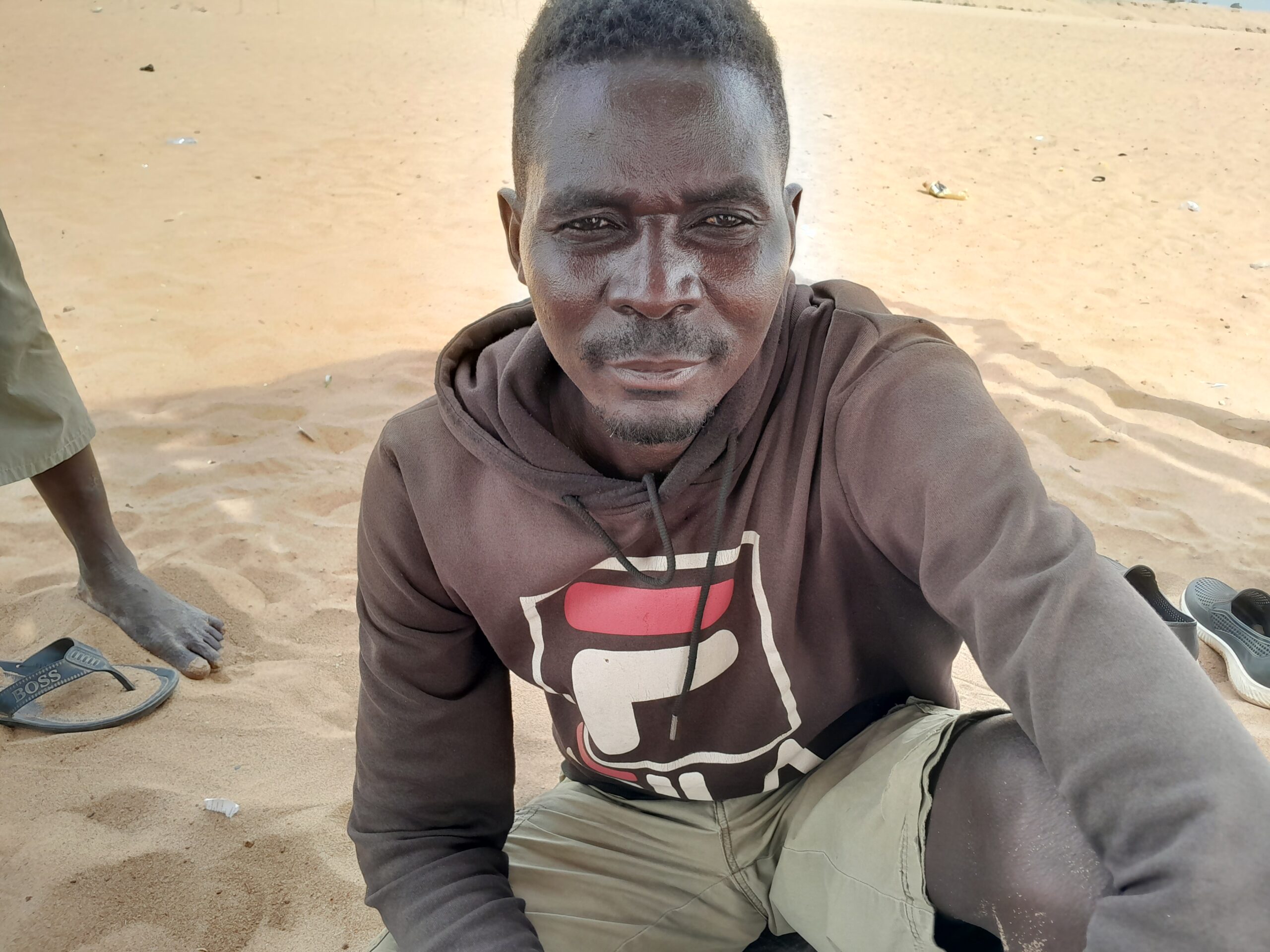Life would never be the same again, so Gibson Gambo thought after he lost his father during his childhood. After his father’s demise, Gambo moved to his uncle’s home, which offered some respite from his grief. As he grew up under his uncle, who was a professional canoe operator, Gambo came to realize a future tilted in that direction.
“After I finished primary school, I began to follow my uncle to the riverside to learn how to drive a canoe,” Gambo said.
This was the life Gambo came to know. He soon embraced his fate and promptly moved to master the craft.
Often, after school hours, Gambo raced to the river, observing keenly how the canoe operators steered their canoes against the river currents. He would continue to visit the river after school each day until he graduated from secondary school. As his uncle grew old and fatigued, Gambo took over the boat business, supporting the family with proceeds from his daily operations. At the same time, he enrolled at the College of Agriculture, Jalingo, where he earned a national diploma in 2007.
The proceeds generated from this work could do even more, according to Frederick Jacob, who began driving canoes over three decades ago.
“This occupation has helped me to set up a family,” Jacob said. The 65-year-old now fends for his wife and seven children through his work. “My little children are still attending school. Two have graduated, and one is already employed in the civil service,” he added.
Jacob, who hails from Munga, a settlement in northern Taraba State, is one of hundreds of individuals plying their boats along the island.
Twenty years ago, Obet Ayuba embarked on his work at the riverside. As with Gambo, Ayuba inherited the craft from his father. Growing up in Lau and seeing his father raise a family from rowing the boat along the canal piqued his interest in the business. He followed suit, at age 9.
“My father was among the pioneers of this work here. They used to transport goods by water from here in Lau to Lokoja in Kogi State,” Ayuba told Prime Progress.
Inflation bites
Until recently, securing a few gallons of fuel to power their daily ferry operations wasn’t quite a pressing concern for Ayuba and his colleagues.
However, the removal of the fuel subsidy has aggravated the cost of operations for them. Worse, the soaring costs of fuel are pushing some of these drivers out of business.
Ayuba used to purchase a gallon of fuel for N1,000, allowing him to transport passengers and goods efficiently. Now, he needs nearly N5,000 for the same amount.
“With these high costs of fuel, operating the ferry is no longer profitable. Even if I cover the fuel costs myself, the fares from passengers and their goods wouldn’t be enough to refill the tank and meet my family’s needs,” Ayuba lamented.
Today, Gambo and some of his colleagues have switched to traditional canoes, which require no fuel. On average, they could earn something between N5,000 and N8,000 daily, but paddling these canoes from dawn to dusk leaves them physically exerted.

While eating enough carbohydrates can provide sufficient energy for a day’s labor, operators like Gambo have to spend much more on food in the wake of rising prices.
“A plate of food used to cost N300, but now it’s between N500 and N600. We are forced to pay these prices because we need to eat before working, and we have families to feed at home. This inflation is affecting us from all sides,” Gambo explained.
Passage
This river, where canoe operators like Gambo and others eke a living, flows into the mighty Benue, separating the lands of Lau and Karim-Lamido in northern Taraba State. Locals say that this river existed long before Nigeria’s independence.
Without bridges, locals within the nearby communities utilized canoes made from local wood to cross the river. It has been a ritual for them for many years.
“We source the wood ourselves and then shape them to our needs. We have experts among us for that,” said Jacob, a seasoned canoe operator.
Decades later, ferries emerged, also constructed from wood, but these are petrol-powered canoes, and they offer a welcome ease for the operators.
The operators formed a union—the National Union of Water Transport Workers—where Gambo serves as secretary. He stated that the riverside is a training ground for newbies who are expected to learn under the wings of an experienced operator until they have mastered the craft. Then they can register with the union.
“When you get registered, you will start transporting passengers and their goods. We are entrusted with people’s lives on this water, you see. That is why we have to ensure rigorous training before allowing anyone to drive a canoe,” Gambo expressed.
Casualties
During rainy seasons, the water rises heavily with currents. The strong waves can pose a challenge to even the most skilled canoe operators. Sometimes, these strong currents cause the canoes to flip over, throwing people and their carriages overboard.
“We have seen canoes turn over in the water many times,” Gambo admitted.
In October 2023, a boat mishap occurred on the Benue River in Karim-Lamido, claiming the lives of many passengers, as reported by Daily Trust.
The overloaded boat, carrying over 100 people, including women and children, capsized while returning from a market. The passengers were reported to have worn no life jackets, and local divers rescued only a small number of bodies.
This incident isn’t an isolated one. Similar tragedies have occurred repeatedly across Nigeria, raising grave concerns about the lack of safety standards on the country’s waterways.
Neglected
Despite contributing N5,000 annually to both state and federal inland waterways authorities, union members maintain that their demands for improved working conditions and essential safety equipment haven’t been met.
“We have been pleading for life jackets, for the safety of our passengers who fear using canoes without them. As you know, accidents happen, and canoes can capsize. But our pleas fall on deaf ears,” Gambo bemoaned.
While Ayuba noted that to continue their operations effectively across this large body of water, they need to upgrade to modern boats to ensure everyone’s safety.
“We are calling upon the authorities to intervene and improve things here. There are hundreds of youths here who depend on this work to survive,” Ayuba said.
Bouncing back
Gambo and others continue to plough ahead amid the challenges. Through his resilience, Gambo has not only carved a path for himself but also trained over 20 young individuals. His mentorship has enabled some to pursue higher education, even securing degrees.
Some of Jacob’s mentees have found stability through marriage and built families, while others have left the riverside and ventured into other fruitful entrepreneurial endeavors.
The life of Gibson Gambo changed profoundly after his father died during his childhood, leading him to live with his uncle, a professional canoe operator. Following his uncle's footsteps, he learned the trade of canoeing, eventually taking over the family business when his uncle aged. Despite the challenges, Gambo earned a national diploma from the College of Agriculture, Jalingo, while supporting his family through his canoe operations.
Many canoe operators face significant difficulties due to rising fuel costs following the removal of the fuel subsidy. These economic pressures have forced some, including Gambo, to revert to traditional canoes, despite the physical strain and comparatively lower earnings.
Gambo and other operators are part of the National Union of Water Transport Workers, which ensures rigorous training for newcomers due to the inherent dangers of the job. These dangers were tragically highlighted by a recent boat mishap on the Benue River, underscoring the urgent need for safety measures such as life jackets.
Despite contributing yearly fees to inland waterway authorities, operators feel their safety concerns and requests for modern equipment are ignored. Leaders like Gambo and Ayuba call for intervention to provide better working conditions and modern boats, which are crucial for their livelihood and safety. Meanwhile, Gambo continues to mentor young individuals, helping them pursue education and alternative careers.






